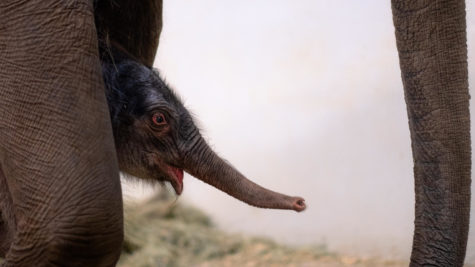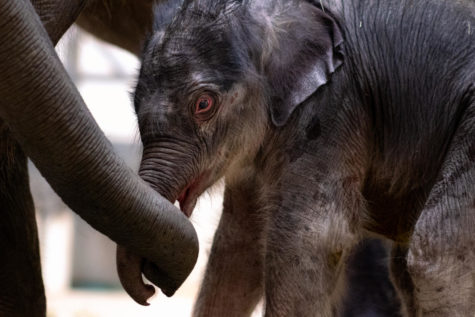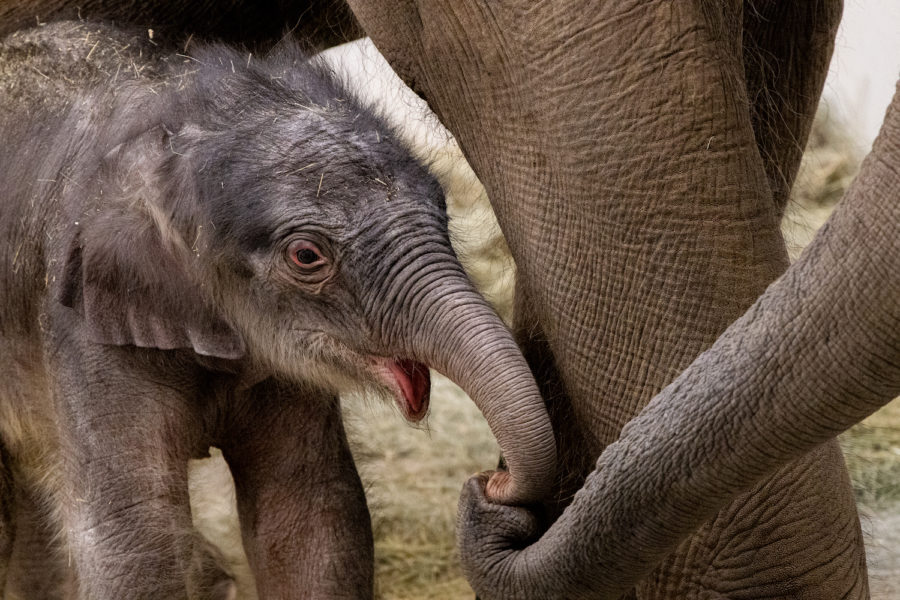The Fort Worth Zoo names baby elephant, but visitors will have to wait for a first look
Travis, the new baby elephant, and Belle, his mom, will make a public appearance at the Fort Worth Zoo after he bonds with the herd and learns to swim. This photo was taken several hours after his birth on Feb. 23, 2023. (Photo courtesy of the Fort Worth Zoo)
Published Mar 9, 2023
The Fort Worth Zoo’s new baby elephant has a name — Travis! The Fort Worth Zoo, continuing its Texas theme, named the newest baby elephant after Alamo hero, William B. Travis, said Avery Elander, a zoo spokesperson. Visitors will have to wait beyond spring break to get a look at the newest Asian elephant baby born two weeks ago at the Fort Worth Zoo.
Waiting for the big reveal
Several factors play into the debut of first-time mother, Belle, and her baby boy at the Elephant Springs habitat, Elander said. “Bonding with mom and herd members is crucial, so keepers want to give the calf plenty of time to get acclimated to his new surroundings,” she said. The elephant care team will monitor weather for optimal outdoor temperatures, while the calf also needs to learn to swim. Travis will start swimming lessons soon in the shallow pools of the elephants’ private enclosure, the spokesperson said, to make sure he can safely handle the 400,000-gallon “river” in the main habitat. He has learned to pick up sticks and hay with his trunk, Elander said, and he explores the nursery enclosure with his mother more independently. 
Elephant conservation
Travis will move to another zoo when he is older. He will contribute to the declining Asian elephant population like his 9-year-old cousin Bowie at the Oklahoma City Zoo. About 25% of Asian elephants are in managed care “as populations in the wild become increasingly endangered due to habitat alteration and poaching,” Elander said. The Fort Worth Zoo in 1998 partnered with the nonprofit conservation group International Elephant Foundation (IEF) to support wild herds through scientific research, education, community solutions and protection. The US Fish and Wildlife Service designated Asian elephants as endangered in 1976. The agency estimates that about 30,000-50,000 of the species live in the wild. 
Training elephant behavior
All the zoo’s elephants are trained with certain behaviors such as opening their mouths, lifting their trunks and feet and presenting their bellies and heads, so caregivers can easily perform medical exams and procedures. The keepers give Travis physical examinations daily, Elander said, and will start training him with positive reinforcements for voluntary blood draws. And he’ll start getting his feet wet soon. “Ultimately,” Elander said, “Belle will determine when he enters the big pool.”
Travis, the newest baby at the Fort Worth Zoo, was born Feb. 23, 2023, and weighed 270 pounds. This is his first video with his mother Belle soon after his birth. (Video courtesy of the Fort Worth Zoo) Now 2 weeks old, Travis is getting more independent and will make his debut soon, according to a zoo official. (Video courtesy of the Fort Worth Zoo)



